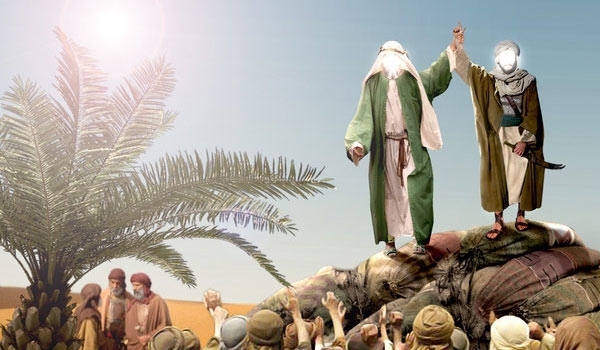Wednesday 26 April 2017 - 16:42
Story Code : 258601
Wilayah and Imamate of Ahl al-Beyt (a) as the Basis of the Genuine Islam
It is also stated in the trustworthy traditions gathered both by Shi�a and Sunni scholars that the Messenger of God (s) announced �Ali ibn Abi Talib (a) as his successor during his last pilgrimage (hajj) on the 18th of Dhul-Hajjah near the place called Ghadir Khum:��Whoever I am his friend, Ali is his friend�.�After that the verse was revealed:��Today I have perfected your religion for you, and I have completed My blessing for you, and I have approved Islam for your religion� (5:3), and before that another verse was also revealed: �O Apostle! Deliver what has been sent down to you from your Lord; and if you don't do it, you have not delivered His message (at all); and Allah will protect you from the people ...� (5:67).
Thus �Ali (a) was marked as the bearer of Wilayah [1] and Imamate, i.e. spiritual and political leadership over the Ummah based on the Divine revelation and possession of some special knowledge that gave him a possibility to comprehend Islam as the wholesome system in all its aspects.
This choice was connected not with the monarchy principle as Islam denies monarchy and this is stated in the letters of the holy Prophet (s), and the Messenger of God (s) was given many other relatives who also laid claims to be the political leaders of the Muslim Ummah due to their blood relationship with the Prophet (s). But they were too far from being just as well as from having a deep comprehension of Islam.
The choice in Ghadir Khum was stipulated by a special spiritual closeness of Ali (a) to the Prophet (s) and the sacred knowledge he gained from the Messenger of God (s), as well as with his being purified from all sins, his deepest insight into both exoteric and esoteric aspects of Islam and Tawhid, with his justice while ruling and judging people, as Shi�ism claims that only a just person who comprehends Islam in all its complicity can be a leader of a Muslim Ummah. This is because justice (�adalat) is one of the central categories of Shi�a understanding of Islam, it is one of�usul ad-din. God Himself is Just (�Adil), and the aim of His Divine Law is justice, and thus the genuine Islamic ruler must be also just. Due to this reason justice is one of the fundamentals of Shi�a political thinking.
Only �Ali ibn Abi Talib (a) surely possessed all those required qualities. His Eminence (a) was a universal personality: a just ruler and a great theologian, a courageous warrior and a poet with a deep esthetic feeling. Ali (a) was a husband of Prophet�s beloved daughter Fatima Zahra (a) and their blessed progeny is considered to be the inheritors of Wilayat. The number of those successors was twelve as it is predicted it the trustworthy prophetic traditions. It is remarkable that these traditions are cited not only in Shia collections but also in well-known Sunni hadith collection �Sahih Muslim� and �Sahih Bukhari�.
Their names are: �Ali ibn Abi Talib (a); Hasan ibn �Ali (a); Hussein ibn �Ali (a); �Ali ibn Hussein; or Imam Sajjad (a), Muhammad ibn �Ali (a); or Muhammad Baqir (a); Ja�far ibn Muhammad, or Imam as-Sadiq (a); Musa ibn Ja�far, or Imam Kazim (a); �Ali ibn Musa, or Imam Ridha (a); Muhammad ibn �Ali, or Muhammad al-Javad (a); �Ali ibn Muhammad, or Imam al-Hadi (a); Hasan ibn �Ali, or Hasan al-Askari (a); and Muhammad ibn Hasan, or Imam al-Mahdi.
Together with the Holy Prophet (s) and his blessed daughter Fatima Zahra (a) they form a community of the sparkling stars of true Guidance and are called the fourteen Infallibles (Ma�sum) because of being purified as it is stated in the Qur�an. All these twelve personalities are the bearers of Imamate and Wilayat. Though the number of them is 14 they form the same Light and they have the united essence that is a true spirit of Islam. That�s why in order to feel this spirit and to make it the basis of our life we must perceive their Guidance as an integral reality that cannot be divided or be deprived from any of its parts.
Here we should also add a brief explanation of the difference between the terms �wilayah� and �Imamate�. These terms are sometimes used to be exploited as synonyms, though there�s a slight but important difference between them. Thus, Imamate is up to wilayah in its sublime universal meaning, as it includes scientific, political, mystical, social, judicial, etc. aspects of wholesome guidance. As for�wilayah, its particular meaning is possessing some kind of sacral knowledge about future or hidden aspects of reality. For instance, Hidhr (a) mentioned in the Holy Qur�an was such a�wali, and as we know from the Book he committed some actions which the Prophet Musa (a) couldn�t understand cause Hidhr (a) possessed some additional esoteric knowledge hidden from Musa (a), but nevertheless Hidhr (a) wasn�t an Imam. At the same time, there is also difference within different aspects of�wilayah, which can be divided to�wilayah al-taqwiniyyah�(universal) possessed by Imam only, and�wilayyah al-siyasiyyah�(political), which can be delivered to a learned and just Islamic jurist (faqih). And while Imam can only be appointed by Allah,�wali al-faqih�can be elected or dismissed.
In coming chapters we�ll view all this items more thoroughly, in sha Allah.
Notes
[1]�In his book �Shi�ism: Imamate and Wilayat� Sayyid Muhammad Rizvi writes: �Wilayah, derived from wila', means power, authority or a right of certain kind. In Shi�a theology, wilayah is the authority invested in the Prophet and the Ahl al-Bayt as representatives of Almighty Allah on this earth�.
# Tags











